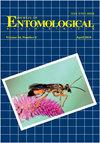Menochilus sexmaculatus (Coleoptera: Coccinellidae)1 的食肉和群内捕食的直接影响
IF 0.7
4区 农林科学
Q4 ENTOMOLOGY
引用次数: 0
摘要
Menochilus sexmaculatusF.(鞘翅目:胭脂虫科)是一种通性捕食者,具有作为生物防治候选者的潜力,可用于抑制许多害虫,包括棉花绵粉蚧(Phenacoccus solenopsis Tinsley)(半翅目:伪球虫科)。然而,M. sexmaculatus 对 P. solenopsis 的潜在控制能力可能不仅取决于它的适应性和捕食效力,还取决于它与共享相同资源的其他个体之间的同种和异种相互作用的后果。本研究调查了不同生命阶段的绣线菊遇到不同阶段的绣线菊或Harmonia axyridis (Pallas)时的攻击性和脆弱性。结果表明,在同种瓢虫和异种瓢虫存在的情况下,雌瓢虫可以充当捕食者和/或猎物。捕食的成功与否受瓢虫生命阶段的影响,在大多数情况下,幼龄阶段的瓢虫最容易被相对较老的瓢虫捕食。同一发育阶段的M. sexmaculatus/H. axyridis幼虫之间的捕食总是不对称的,有利于H. axyridis。此外,M. sexmaculatus对同种个体比异种个体表现出更强的攻击性,但对H. axyridis个体比对M. sexmaculatus个体更脆弱。总体而言,H. axyridis的高攻击性和低脆弱性可能会对M. sexmaculatus的种群密度产生负面影响。然而,由于我们的研究是在一个过于简单和狭窄的区域进行的,因此应该在更现实的条件下进行更多的研究,以探讨H. axyridis对M. sexmaculatus种群动态的影响。本文章由计算机程序翻译,如有差异,请以英文原文为准。
Direct Effect of Cannibalism and Intraguild Predation in Menochilus sexmaculatus (Coleoptera: Coccinellidae)1
Menochilus sexmaculatusF. (Coleoptera: Coccinellidae) is a generalist predator with potential as a biological control candidate for suppressing many insect pests, including the cotton mealybug, Phenacoccus solenopsis Tinsley (Hemiptera: Pseudococcidae). However, the potential control capacity of M. sexmaculatus on P. solenopsis may depend not only on its fitness and predatory efficacy, but also on the consequences of both conspecific and heterospecific interactions with other individuals that share the same resource. This study investigated the aggressiveness and vulnerability of different life stages of M. sexmaculatus when encountering various stages of M. sexmaculatus or Harmonia axyridis (Pallas). The results showed that M. sexmaculatus could act as predator and/or prey with the presence of conspecific and heterospecific ladybird beetles. The success of predation is affected by the ladybird beetle life stage and, in most cases, young stages of the ladybird beetles were most susceptible to relatively older life stages of ladybird beetles. Predation between M. sexmaculatus/H. axyridis larvae of the same developmental stage was always asymmetric, favoring H. axyridis. Moreover, M. sexmaculatus exhibited intensive aggressiveness toward their own species over heterospecific individuals, but was more vulnerable to H. axyridis than to M. sexmaculatus individuals. Overall, H. axyridis could negatively affect the population densities of M. sexmaculatus by its high aggressiveness and low vulnerability. However, because our study was conducted in an oversimplified and confined area, more research should be conducted under more realistic conditions to explore the impacts of H. axyridis on the population dynamics of M. sexmaculatus.
求助全文
通过发布文献求助,成功后即可免费获取论文全文。
去求助
来源期刊
CiteScore
1.20
自引率
11.10%
发文量
40
审稿时长
>12 weeks
期刊介绍:
The Journal of Entomological Science (ISSN 0749-8004) is a peer-reviewed, scholarly journal that is published quarterly (January, April, July, and October) under the auspices of the Georgia Entomological Society in concert with Allen Press (Lawrence, Kansas). Manuscripts deemed acceptable for publication in the Journal report original research with insects and related arthropods or literature reviews offering foundations to innovative directions in entomological research

 求助内容:
求助内容: 应助结果提醒方式:
应助结果提醒方式:


